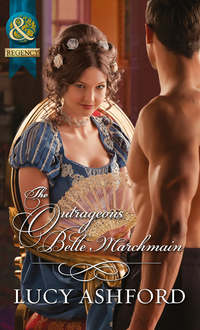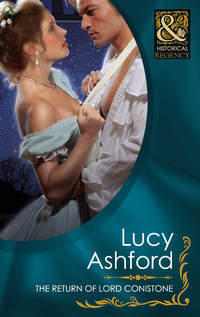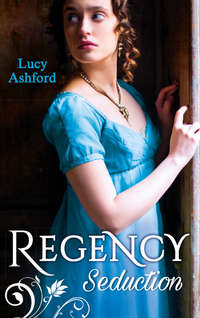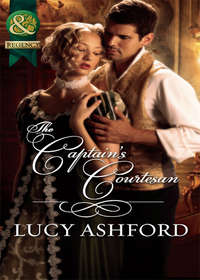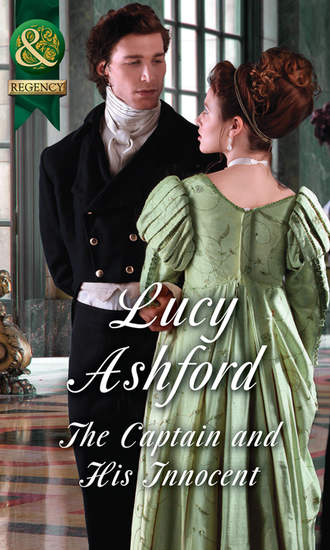
Полная версия
The Captain And His Innocent
despite his generosity—to be reluctant to let her meet anyone, or to let her go out anywhere. Once, she had asked him if he was in contact with any of her mother’s other relatives, and he replied, ‘Oh, my dear, most of them have died, or live somewhere in the north. No need to trouble yourself over them.’
Ellie was surrounded by a luxury she’d never known, but she hated being confined in that big house. Nevertheless she was determined to keep her promise to her father. Lord Franklin will keep you safe, as I have never been able to.
But her trust in Lord Franklin was badly shaken when one day she returned to her room after lunch and realised that, in her absence, someone had made a very thorough inspection of all her belongings.
She felt sick with the kind of shock and fear that she’d hoped never to feel again. To anyone else, certainly, there were no outward signs of disturbance—but she, who was used to running, used to hiding, could tell straight away. Someone—surely not her maid, who was a young, shy creature—had been through everything: every item of clothing, every personal effect in her chest of drawers and wardrobe. Ellie even felt sure that each book on her bookshelf was in a different place, if only by a fraction of an inch.
With her pulse pounding, she’d pulled out her father’s old black valise from the bottom of her wardrobe.
The lock was still intact—but if she looked closely, she could see faint scratch marks around it. Someone had been trying to get inside.
She went downstairs to find Lord Franklin. He was out a good deal of the time, either at his club or attending art auctions; but from the housekeeper she learned that, as luck would have it, he was in his study, talking to a man called Mr Appleby, who was, the housekeeper informed her, the steward at Lord Franklin’s country home, Bircham Hall.
Ellie had knocked and gone in.
‘Elise!’ Lord Franklin had turned to her, with his usual pleasant smile. ‘What can I do for you?’
Mr Appleby stood at his side; he was a little older than Lord Franklin, clad in a black coat and breeches, with cropped grey hair and with spectacles perched on the end of his nose. She glanced at him, then said to Lord Franklin, ‘Someone, my lord, has been through my possessions. Has searched my room.’ She’d meant to sound calm, but she could hear a faint tremor in her voice. ‘I would be obliged if you would question your staff. I really cannot allow this.’
Mr Appleby had looked as shocked as if she’d challenged Lord Franklin to a pistol duel. Lord Franklin himself was frowning in concern.
‘This is a grave allegation, my dear,’ he murmured. ‘But are you sure?’
‘I am completely sure. My lord.’
‘You perhaps doubt the honesty of my servants, Elise? You doubt their loyalty to me? Is anything actually missing?’
‘No! But that is not the point...’
Lord Franklin had turned to his steward. ‘Leave us a moment, would you, Appleby?’
‘Now, Elise,’ said Lord Franklin, when Mr Appleby had gone. ‘I’ve been thinking lately that perhaps London does not suit you. I’ve been wondering if you might like to live in my country house in Kent for a while—it’s in a peaceful area near to the coast and it will, I’m sure, be more restful for you than London, after the various ordeals you have endured. Do you have any objection?’
For a single wild moment, Ellie had thought of fleeing the Mayfair house, and of running back to...to where?
His lordship was already opening the door, to indicate their interview was at an end. ‘Bircham,’ he informed her, ‘is barely sixty miles or so from London, which makes it an easy journey, if spread over two days. And you really will be most comfortable there.’ He stood by the open door, waiting for her to agree. Her father’s voice echoed insistently in her ears. Lord Franklin will keep you safe.
She had bowed her head. ‘As you wish, my lord.’
* * *
And now, here she was at Bircham Hall. It was almost six o’clock and dinner would be served shortly. She paced her room in agitation. It must be safer than France, she kept telling herself. And safer than London, where someone had searched her room—she’d been sure of it. But here, she’d found danger of an entirely different kind.
Lord Franklin’s formidable mother she felt she could deal with. But now, despite the heat of the room, she shivered afresh as she remembered the man on the road—the dark-haired man in the long coat, with the black-gloved hand—holding her father’s compass so casually. Lord Franklin is said to be a great collector of foreign objets d’art. And what could be more fitting than for him to return from the Continent with a pretty French girl in his care?
Ellie gazed at herself in the mirror, seeing her face, with her wide green eyes and dark curls and even darker lashes. Was she pretty? She’d never troubled to think about it. She’d spent months hiding from men who might be hunting her, months concealing her feminine figure with drab clothing, keeping, always, in the shadows.
But now, she remembered the way that man by the roadside had looked at her. She’d been travel-weary and full of foreboding about her future, and the sudden and silent arrival of someone she realised instantly posed as strong a threat as any she’d yet faced should have set fierce alarm bells jangling in her brain. She’d behaved stupidly, by not running straight away, back to the coach—surely he wouldn’t have dared to pursue her?
And yet, the very moment she saw him—yes, with his old, patched coat, his overlong black hair, his dagger-sharp cheekbones and his black-gloved hand—her heart had stopped and her breathing had quickened. Try as she might, she could not banish the memory of the way his blue eyes—his utterly dangerous blue eyes—had scoured her and seen through her, until her whole being had been infused with a sense that here was a kind of man she had never met before. The kind of man she had perhaps dreamed one day of meeting...
Fool. You fool. Even now, she shivered with something that had nothing to do with the coldness of the night and far more to do with the memory of his lean, powerful body and his husky voice. Drawing a deep breath, she looked around her suite of rooms. All quiet. All undisturbed. But what next? Whom could she trust? Could she even trust herself?
The dinner bell clanged loudly in the hall downstairs, and then Miss Pringle arrived to escort her to the dining room. To ensure that Ellie remembered to go down to the dining room, more like—and poor Miss Pringle, she appeared even more nervous than Ellie was. ‘Such an honour,’ she exclaimed, ‘to be invited to dine with her ladyship. But...’ She was eyeing Ellie’s faded gown with obvious trepidation.
‘Yes?’ Ellie asked politely.
‘I think—I think Lady Charlotte might expect you to wear something a little more appropriate for dinner...’
‘I am perfectly comfortable in this dress,’ Ellie said quietly but firmly.
‘Yes, of course.’ Miss Pringle nodded, wringing her hands a little. Then she led the way, along the corridor and down the stairs.
* * *
Dinner lasted over two hours. And at the end of the final course, Lady Charlotte expressed herself to be profoundly disappointed with Ellie’s company.
‘I thought the French were renowned for their wit and gaiety,’ she said. ‘I was going to invite you, Elise, to join me in my parlour; but I think it better if you retire to your room and count it your very good fortune that my son has taken you into his care.’
Thankful for her escape, Ellie went upstairs and closed her door. But she knew that sleep wouldn’t come easily.
Had Lord Franklin really found her by chance? Why had her room in London been searched? And the man. The man on the road. He’d probably forgotten her
already—but she already feared she would find it impossible to forget him.
Chapter Six
During the next few days, as the rain fell relentlessly outside and darkness closed in by four, Ellie grew quietly more and more desperate. Mealtimes with Miss Pringle and Lady Charlotte came round each day with monotonous regularity. Every evening at six, Ellie went down to the vast dining room whose panelled walls were hung with daunting portraits of Grayfield ancestors.
Lady Charlotte was invariably there before her—her ladyship was wheeled in by her footmen from her ground-floor suite at five minutes to six precisely. Once she was settled at the head of the table, she would watch with eagle eyes as the courses were brought in and served on fine china plates adorned with Lord Franklin’s family crest.
Soon Ellie knew by heart the ancestral portraits that hung on the walls and the sculptures that adorned every alcove, every niche of the great house. A nightmare for the servants, thought Ellie. They must require constant dusting—something else for Lady Charlotte to complain about. And complaining was her ladyship’s chief occupation, it seemed, especially at mealtimes.
Lady Charlotte criticised every course as it was served, pointing out to the unfortunate butler Mr Huffley that the soup was too hot, or the veal lacked salt. She never complained about the wine, though; she was partial to Madeira or sherry and liked her glass to be constantly replenished.
Miss Pringle didn’t drink wine and she ate her food in hungry nibbles, at the same time endeavouring to listen intently to Lady Charlotte’s every word. Lady Charlotte’s main topic of conversation, once the food had been criticised, was her son—she loved to talk of his travels and his many illustrious acquaintances amongst the ton. But she never, ever spoke of his dead wife, or of his son—who Ellie gathered held some colonial post out in India.
Once, Miss Pringle timidly mentioned after dinner that Ellie had told her she could play the piano.
‘The piano? Is this true?’ Lady Charlotte asked.
‘Only a little, my lady,’ Ellie replied. ‘My mother taught me to play in Paris and I—’
‘I cannot bear the sound,’ Lady Charlotte interrupted, ‘unless it is played by a true musician. I know what I shall do to entertain you this evening, Elise. You may come to my private parlour to look at some miniatures that a London artist painted of Lord Franklin when he was twenty-one. They are very fine. Come in an hour—I will have taken my rest by then.’
Ellie didn’t think she was early, but she must have been, because after knocking and walking into Lady Charlotte’s ground-floor suite, she saw Lady Charlotte in there alone. And she was standing—standing—by the sideboard, pouring herself a large glass of sherry.
Lady Charlotte heard her and spun round. With a face like stone, her ladyship returned to her nearby bath chair—walking with no obvious difficulty—and sat down. She said, icily, ‘Some days, I find that I can move a little better than others. Mostly, of course, I am a complete invalid. Why are you here?’
It took a minute for Ellie to find her voice. ‘You wished to show me some miniatures, my lady.’
‘Ah. The miniatures. Pringle got them out for me—they’re here, somewhere...’
Ellie looked around almost wildly for a servant or footman—for anyone else who might have witnessed the scene. Did anyone else know Lady Charlotte could walk?
Whether they did or not, Ellie knew she had to keep silent about this strange episode. You’re in enough trouble already. Quite enough.
* * *
Lady Charlotte appeared to forget the incident altogether and continued to goad Ellie at every opportunity. ‘I hear,’ she announced one evening at dinner, ‘that London has changed out of all recognition in the last few years.’
Miss Pringle looked up nervously, her eyes darting to Ellie; Ellie remained silent, aware now of Lady Charlotte glaring ominously at her.
‘I have been reliably informed,’ Lady Charlotte went on, ‘that the city is becoming overrun with poverty-stricken vagrants.’
Miss Pringle was nodding. ‘Oh, indeed,’ she echoed. ‘Overrun. Quite true.’
‘In particular,’ pronounced Lady Charlotte, ‘one hears the most dreadful stories of foreigners who come over daily on the packet boats hunting for work, or more likely looking for mischief. The French, in other words. Now that the war is over, I hope that our prime minister and his government will send them all back to where they belong.’
Miss Pringle let out a little gasp. Ellie rose from her chair abruptly and said, ‘Please excuse me from the remainder of the meal, your ladyship.’
Lady Charlotte peered crossly at her. ‘What? What? It’s really most irregular of you to retire before I have even begun my dessert!’
‘I realise that. But I feel particularly tired today and I really need to go to my room. Pray accept my apologies—Lady Charlotte, Miss Pringle.’
She made a brief curtsey and hurried from the dining room. Just outside the doors stood the two footmen who pushed Lady Charlotte around in her bath chair. They had their backs to Ellie and were talking. And she felt a sense of cold shock, as their topic of conversation became only too apparent.
‘What do you make of the young French girl, then?’ one was saying.
‘If you ask me, she’s not as quiet as she looks. Got a spark of liveliness in her eyes, most definitely.’ The other footman chuckled. ‘A pity it’s all wasted here. But perhaps she misbehaved in London...’
Ellie walked past them and past the antique statues to the stairs, her cheeks burning as she climbed up to her room on the second floor. And as she stood in her lonely sitting room, trapped in that great, cold English mansion, with the footmen’s whispered vitriol and Lady Charlotte’s stark disapproval still echoing in her ears, she felt a hollow emptiness inside.
She’d been here nearly a week. The thought of another week was beyond endurance. I cannot stay here any longer, she thought. I cannot stay here, where I don’t belong.
To leave would mean breaking her vow to her father—her promise that she would come to England and be safe. But it had been a huge, huge mistake to put herself at the mercy of strangers.
She had to get away, and Brussels was the only place she could think of: Brussels and the lodgings where she and her father had stayed for the last few weeks of her poor father’s life. Maybe the kind landlady would allow her to rent her old room again, if it was still free? And surely she could find a job nearby—on a market stall, or in the baker’s shop itself. Then she would be able to visit her papa’s grave at the little church of St Marie every day.
She pushed aside the heavy curtains and gazed out of the window into the night. After days of heavy rain, the velvety sky was clear at last and far beyond the woods surrounding the Hall’s gardens, she could see the moonlight reflected off the distant sea. Suddenly she remembered the small fishing port she’d noticed on her way here.
Bircham Staithe, Mary had told her it was called. It lay only a little way beyond the boundaries of Lord Franklin’s estate—less than a mile, she guessed. And once there...
She had money. She could make up a story to some kind sea captain about how she had to return home now that the long war was over. Surely it would be straightforward to pay for a passage to northern France on a fishing vessel.
Already she was putting on her walking boots and her hooded cloak; already she was picking up her black leather valise, then she let herself quietly out of her room and stood there listening. The big house was absolutely silent. Making her way swiftly down the narrow servants’ staircase, she slipped out of a side door into the enveloping darkness of the garden.
Freedom. She drew in deep breaths of the cold night air, but still hesitated before plunging into the shrubbery; because she knew that like most landowners, Lord Franklin kept half-a-dozen great mastiffs as guard dogs, which were let loose from their kennels by his groundsmen after dark.
Sometimes the dogs were released for only half an hour, though the timing of their outings was changed deliberately each night. But now Ellie reminded herself that she’d heard them in the grounds earlier, as dinner was being served, so surely they would be back in their kennels by now? She took the path through the shrubbery, aware of her pulse racing, but there were no cries of alarm from the house—neither dogs nor servants were giving chase. All was mercifully quiet.
Ellie had learned, during her travels with her father, to choose her route carefully, then follow it without hesitation. She’d noted on her first day here that beyond the shrubbery, smooth lawns and flowerbeds stretched to the boundary of Lord Franklin’s estate, where the stone wall offered footholds in plenty for her to climb. From there she judged it was only a short distance to the road which led to the little port of Bircham Staithe.
She crossed the gardens and climbed the wall swiftly in the darkness. All that remained was to listen out for pursuers—and this was what troubled her now, as she hurried along the road that led down to the sea. She thought she’d heard muffled footsteps, in the woods to her right. She stopped, her breath catching in her throat.
Her thoughts flew to the man in the long grey coat, who’d held her father’s compass in his hand and looked at her as if he could read her innermost secrets. Her heart hammered, but there was nothing now—no sound at all, except the whispering of the wind and the distant hiss of the sea. Perhaps it had been a small wild animal, or a bird scuffling in the undergrowth...
Four men loomed out of the darkness ahead of her. Four men dressed in the rough garb of fishermen, who’d spread out to bar her escape.
‘Well, well,’ the first one said, drawing closer. He wore a short serge jacket and strands of lank fair hair hung around his thin face. ‘What have we got here? Looks like we’ve struck lucky tonight, lads.’
Chapter Seven
Luke Danbury was in a smoky tavern down by the harbour of Bircham Staithe, drinking rough ale and playing dice with a group of local fishermen. But his mind was miles away.
It was several days since Jacques had sailed back to France—heading south towards La Rochelle on the coast—and by now Jacques and his men would be searching. Questioning. Offering bribes, offering threats—all in the probably vain hope that Luke’s brother wasn’t dead, like the rest.
Suddenly he realised that one of the fishermen was nudging him. ‘Your turn, Captain.’ Luke nodded and gathered up the dice. He threw them awkwardly, of course. He did everything damned awkwardly with his left hand. He remembered the bleak night last autumn when the bandaging was removed for the first time and Luke—low in spirits after weeks of enforced inactivity—had said to Jacques, ‘The next time, I will go to France with you. I cannot wait here any longer doing nothing, when my brother might need me.’
Then he’d seen the look on Jacques’s face. And he’d known exactly what the Frenchman was thinking, even if he was too kind to say it. You? With your crippled hand? What earthly good would you be to us? You cannot row a boat. You cannot wield a sword, or fire a gun.
Luke’s dice landed high and he realised that for once the pile of copper coins at his side was growing bigger. Well, there was a surprise. He ordered more ale for them all and muttered, under his breath, ‘Anthony. If you’re still alive, for God’s sake let Jacques find you.’
And then, Tom Bartlett was at his elbow, with the Wattersons standing big and burly behind him. ‘You’re wanted outside, Captain.’
‘Who by?’
‘A bunch of local ruffians. And Sam Snaith is their leader.’
A hushed silence descended on the tavern. ‘Why does he want me?’
‘He says he’s got someone interesting for you to meet. A girl—’
Luke was on his feet. He knew, without having to ask any more. He knew, as he strode around to the back of the tavern, where a dim light from a window illuminated the dingy courtyard.
Sam Snaith and his companions looked as disreputable as ever. They were all fishermen, supposedly, though he guessed they’d rarely brought in an honest day’s catch in their lives. But this time, they’d actually caught something of value. Luke exhaled sharply.
Just as he’d suspected—there she was. The French girl who’d been heading for Bircham Hall in Lord Franklin’s coach when he last saw her. The girl with the compass.
She’d been as haughty as hell with him, turning up her pretty nose in the air. And now that she’d recognised him, she was struggling even more desperately to free herself from Sam and his men, which they were enjoying, because it gave them all the more opportunity to manhandle her.
And he couldn’t bear it.
‘Stop,’ Luke rapped out at them. ‘Get your filthy hands off her. Now.’
They let her go, reluctantly. The girl lunged for a leather valise that had dropped to the ground and ran.
‘Tom,’ ordered Luke. ‘Get her.’
The Wattersons went after her, too. The three of them brought her back, and this time she didn’t struggle. But that leather bag, Luke noticed. She clung to it as if it meant more to her than life itself.
‘So,’ he said. ‘We meet again. Having an adventure, are you?’
* * *
She threw him a look that expressed downright contempt, but even so, something smote him deep in his guts. That wild dark hair, he marvelled. Those eyes. Green, with flecks of amber that glowed brilliantly in the candlelight. She was proud, she was brave—and beneath that bravado he guessed she was absolutely desperate. Whatever kind of mess she’s in, it’ll be all her own fault, he told himself fiercely.
Tom nudged him. ‘Captain, behind you—’ and Luke was suddenly aware that Sam Snaith, all lanky hair and crooked teeth, was sidling up close.
‘Now, look here, Captain,’ Sam began. ‘She was our captive first of all. And we trust you to treat us right for this. See?’
‘Treat you right,’ said Luke thoughtfully. ‘Now, what do you mean by that, I wonder? Should I, perhaps, break every bone in your miserable body for attacking a defenceless girl?’
‘Her? Defenceless? Ha! The wench knows how to put up a fight—you saw her!’
Tom and Josh were holding her by her arms, but she’d gone extremely still, as if her instincts told her he, Luke, was far more dangerous than Sam or his rogues. And by God, her instincts were right.
‘You told us, Captain!’ Sam was grumbling. He shoved his fists on his hips and stared up at Luke belligerently. ‘You said there’d be a reward for any news about the girl staying at Bircham Hall. And we’ve done better than that, see? We’ve brought her to you!’
‘Well—almost,’ said Luke. ‘Though I do believe I saw her a few moments ago giving all four of you the slip. Did you kidnap her from the house?’
‘What—and take on Lord Franklin’s men? No chance of that. But me and my lads, we were out on the Bircham road, minding our own business—’
‘You’d been thieving, you mean? Or poaching?’
Sam scowled. ‘Minding our own business, as I said—when all of a sudden, we saw the girl. She was scurrying along with that bag clutched in her hand, but Nathan here recognised her. Nathan said, “She’s the new girl, at Bircham Hall! The French girl that everyone’s talking about!” So we stopped her.’
Luke glanced at her, seeing the rapid rise and fall of her small breasts beneath her clothing, noting the fear that still shadowed those wide, alert eyes of hers. ‘I imagine,’ he said, ‘that she was less than delighted.’
‘We treated her well enough! We asked her, polite like—“Where are you going to, miss?”—and she said that she would give us money, good money, mind, if we would find her a ship that would take her over to France! But since you’d promised a reward, we brought her to you, see?’
Luke turned and said to her, ‘Is this true?’



